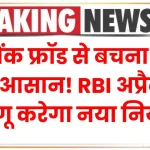
Are you looking for a safe and simple investment plan that can help you accumulate a sizable amount of money—₹3.56 lakh in 5 years? If yes, then the Post Office Recurring Deposit (RD) scheme could be the perfect solution. With just a modest monthly deposit, you can build a substantial fund while enjoying government-backed security and decent interest returns.
In this article, we’ll break down how you can get ₹3.56 lakh from the Post Office in 5 years, how much you need to deposit every month, how the interest works, and why this is a smart financial move. Whether you’re a first-time investor, a parent saving for your child’s future, or a professional looking for a low-risk saving tool, this guide has got you covered.
Post Office Scheme 5 Years
| Details | Information |
|---|---|
| Investment Scheme | Post Office Recurring Deposit (RD) |
| Monthly Deposit Required | ₹5,000 |
| Tenure | 5 years (60 months) |
| Interest Rate | 6.7% per annum (compounded quarterly) |
| Total Investment | ₹3,00,000 |
| Maturity Amount | ₹3,56,829 (approx.) |
| Interest Earned | ₹56,829 (approx.) |
| Risk Level | Low – backed by Government of India |
| Minimum Deposit | ₹100/month, in multiples of ₹10 |
| Premature Withdrawal | Allowed after 3 years with conditions |
If you’re looking for a safe and disciplined way to save ₹3.56 lakh in 5 years, the Post Office Recurring Deposit is an excellent option. With a monthly commitment of just ₹5,000 and the security of a government-backed scheme, you’re not only growing your money but doing so without any market risks.
What is the Post Office Recurring Deposit Scheme?
The Post Office RD scheme is a government-backed small savings plan that allows you to invest a fixed amount every month for a period of five years. At the end of the tenure, you receive a lump sum amount that includes your total deposits plus interest earned.
Why Choose Post Office RD?
- Safe Investment: It’s one of the safest savings schemes, backed by the Indian government.
- Fixed Interest: Currently offering 6.7% annual interest, compounded every quarter.
- Flexible Entry: Start with as little as ₹100/month.
- Discipline: Encourages regular saving habits.
This makes it a great choice for middle-class families, salaried employees, students, and retirees who want to build wealth without risking their capital.
see also: Post Office FD vs Bank FD: If You Deposit ₹8 Lakh in a 36-Month TD of Post Office
How to Get ₹3.56 Lakh in 5 Years
Now let’s get into the numbers.
If you deposit ₹5,000 every month into your Post Office RD account for 5 years, here’s what your returns would look like:
Calculation Breakdown
- Monthly Investment: ₹5,000
- Total Investment over 5 years: ₹5,000 × 60 = ₹3,00,000
- Interest Rate: 6.7% per annum (compounded quarterly)
- Maturity Amount: ₹3,56,829 (approx.)
That’s a gain of ₹56,829 – completely safe and assured!
How Does the Interest Work?
The interest in Post Office RD is compounded quarterly. This means you earn interest not just on your deposit, but also on the interest already accumulated.
Here’s the formula used:
M = R × [(1 + i)^n – 1] / (1 – (1 + i)^(-1/3))
Where:
- M = Maturity amount
- R = Monthly deposit
- i = Quarterly interest rate = 6.7% ÷ 4 = 0.01675
- n = Total quarters = 5 years × 4 = 20
This compounding significantly boosts your final amount over time.
How to Open a Post Office RD Account
Opening an RD account at the Post Office is quick and hassle-free.
Steps to Open:
- Visit your nearest Post Office.
- Fill out the RD Account Opening Form (Form A).
- Submit KYC documents:
- Aadhar card
- PAN card
- Passport-size photograph
- Deposit your first month’s amount in cash or cheque.
- Collect your RD passbook.
Alternatively, if you have an India Post Payments Bank (IPPB) account, you can open and manage your RD online via the IPPB Mobile App.
Who Should Invest?
This RD scheme is ideal for:
- Salaried individuals looking for fixed returns
- Parents saving for child’s education
- Senior citizens wanting a safe saving option
- Students saving pocket money regularly
- New investors looking for a risk-free investment
Tax Implications
- The interest earned on RD is taxable under “Income from Other Sources”.
- If the total interest exceeds ₹40,000 (₹50,000 for senior citizens) in a year, TDS at 10% will be deducted.
- You can submit Form 15G/15H to avoid TDS if your income is below the taxable limit.
Learn more about tax rules from the Income Tax Department.
Pros and Cons
Benefits
- Assured returns
- No market risk
- Flexible monthly deposits
- Suitable for all age groups
- Premature withdrawal (with conditions)
Limitations
- Lower returns compared to mutual funds
- Taxable interest
- No liquidity before 3 years
see also: Punjab National Bank Changed the Rates, Know the Latest Update
Alternatives You Can Consider
If you want to explore beyond RD, here are some options:
| Scheme | Interest Rate | Lock-in Period | Risk Level |
|---|---|---|---|
| Public Provident Fund (PPF) | 7.1% | 15 years | Very Low |
| Sukanya Samriddhi Yojana | 8.2% | Until age 21 | Very Low |
| Bank Fixed Deposits (FD) | 6% – 7.5% | 1–5 years | Low |
| Mutual Fund SIPs | 10–15% (historical) | Flexible | Moderate to High |
Post Office Scheme 5 Years FAQs
Q. Can I invest more than ₹5,000 per month?
Yes, there is no upper limit. You can invest ₹6,000, ₹10,000 or more, in multiples of ₹10.
Q. What happens if I miss a deposit?
A penalty of ₹1 for every ₹100 per month is charged. After 4 consecutive defaults, the account is discontinued but can be revived within 2 months.
Q. Can I withdraw money before 5 years?
Yes, but only after 3 years from the date of opening, and only one withdrawal (up to 50% of balance) is allowed.
Q. Is there a nomination facility?
Yes. You can nominate a family member during account opening or later.
Q. Can I open more than one RD account?
Yes. You can hold multiple RD accounts in your name or jointly with someone else.











